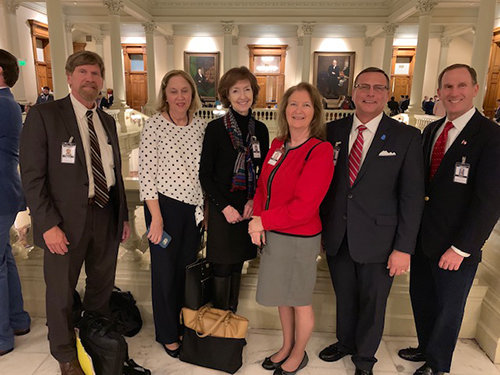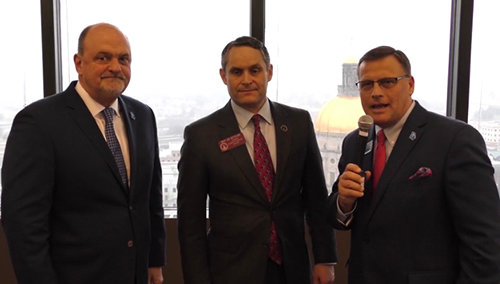The legislative session of the Georgia General Assembly is the busiest three months of my year. It is not uncommon by the end of a 2-year legislative cycle that Georgia Baptists will have monitored up to 40 pieces of legislation. This year, with it being the first year of a new legislative cycle, we tried to keep up with approximately 20 bills covering 11 subjects.

Because of Georgia Baptists reputation and influence at the Georgia Capitol we tried to focus more this year on three major topics of legislation: religious liberty, abortion, and gambling.
We are thankful once again for the leadership of Senator Marty Harbin in introducing the Religious Freedom Restoration Act (RFRA) again in the Senate. SB 221 was introduced in the Senate Judiciary Committee but Senator Harbin declined testimony until he had more time to explain the legislation and then have a vote to move the bill forward to the Senate for a vote. The bad news is that another hearing was never scheduled in time to move the bill this year. The good news is that this legislation is still alive to be moved upon in 2020.
We have been working hard for five years trying to pass a RFRA in the Georgia General Assembly. We are not intending to give up on this important protection for our citizens. Stay tuned for more information on how we will be working together with other faith groups to make sure Georgians have full religious liberty protection in practicing their faith and doing missions in the state of Georgia.

I am excited to say that in spite of the fact that we did not pass a RFRA, we did see the passage of the most protective prolife legislation in the history of the state of Georgia and one of the best in our nation! HB 481, the Living Infants Fairness and Equality Act (LIFE ACT), also known as the Fetal Heartbeat Bill was sponsored in the House by Representative Ed Setzler and represented by Senator Renee Unterman when it came to the Senate. We are so thankful that this passed the General Assembly and is on its way to Governor Brian Kemp to be signed into law!
We need to keep in mind that this important legislation reflects our values as a state and ensures that all Georgians – regardless of age – have the opportunity to live, grow, and prosper. Through the LIFE Act, the legislature codified the “Personhood” of the unborn – that they possess unique DNA, a circulatory system, and blood type – and thus it protects these innocent babies from termination after a medical provider detects a heartbeat. In addition, the LIFE Act affords new benefits to expecting mothers, like access to child support and a tax deduction. This legislation provides the unborn child the same rights that we all have and cherish.
The LIFE Act protects the unborn, affirms the value of life, and helps all Georgians realize their full potential. This is legislation that we, as Georgia Baptists, affirm as embracing the Biblical standard that all life is valuable because it is created in the image of God and is worthy of protection under our constitution.
Georgia Baptists stand firmly behind all of the courageous legislators who were willing to defend the most vulnerable among us! We want to assure them of the support of our pastors, staff, and membership for this legislation. For those who helped us get this to the Governor’s desk, we are tremendously grateful.
The last five years have been filled with legislation to expand legalized gambling in our state. This year a very concerted effort was given by Senator Brandon Beech and Representative Ron Stevens to pass this socially dangerous legislation.
Sen. Beech pushed very hard in trying to get the Senate to take up legislation (SB 45 and SR 84) that would have made pari-mutuel betting on horse racing legal in our state. This legislation was much more than just gambling on horses at a track in our state. It would have allowed gambling machines much like you would see in casinos. In addition, it would allow betting on other races around the country and the ability to bet on races from electronic devices while away from the track. We are so thankful that SB 45 and SR 84 never made it to the Senate Floor for a vote.
Rep. Stephens once again introduced legislation (HR 327) to promote casino gaming facilities known as “destination resorts.” As usual, these types of facilities host some of the most dangerous predatory gambling that any state could allow to exist. The fact that this legislation was dressed up as destination resorts does not take away from the fact that it would be a moral blight that Georgia does not need. The negatives that come from increased crime, sex trafficking, addiction, bankruptcies, job loss, and the redirecting of spending from basic necessities is not worth the risk. Thankfully, this bill, too, did not make it to the floor of either chamber!
As I mentioned earlier, we were monitoring a number of pieces of legislation in addition to the above-mentioned priorities. One had to do with hate crimes (HB 426) as introduced by Representative Chuck Efstration.
There are a number of reasons that this legislation is very problematic. 1) It violates equal protection by treating some victims as more worthy of protection than others. 2) It ends up punishing thoughts, not actions. 3) Hate crimes bills ignore that the act is already a crime; instead, they ramp up punishment because the perpetrator was thinking something the government disapproves of. 4) It empowers the government to assess and approve/disapprove thoughts. 5) It injects identity politics into Georgia criminal law. 6) It will inevitably be used against Christians, as has happened in Canada and the United Kingdom. And, 7) it would allow, for the first time in Georgia Code, “sexual orientation” as class of citizens with special protection.
Thankfully, while this bill did pass the House, it never received a hearing in the Senate and therefore was never voted on. However, it is still alive to be dealt with in 2020.
The Georgia General Assembly legalized the in-state growing, processing, and distribution of marijuana for medical use. HB 324, sponsored by Representative Micah Gravely, passed on the 40th day, in the final hour of the legislative session. The House version of this legislation was amended in the Senate to be much more restrictive to insure that marijuana allowed in our state would be strictly monitored for medical purposes. After the House rejected the Senate version, a conference committee was appointed to work out a compromise between both chambers. The conference report was more restrictive that the original House bill, but not as strict as what the Senate originally proposed.
Nevertheless, we are now going to have marijuana grown in our state for the purposes of medical use. The problem is that this opens the door for the future expansion of recreational use. However, it does give relief to those patients in need of access to medical marijuana. All the legislators involved in the leadership of this expansion have expressed they are not doing it for recreational use. However, the abuses and eventual expansion in other states are going to make this a difficult stand to maintain.
Georgia Baptists have maintained a neutral position on medical marijuana, but have opposed cultivation and recreational use because of what has happened in other states that began this process. Marijuana is still a Schedule I drug that has not been approved by FDA and is illegal to possess, grow, distribute, and transport. However, the Federal Government has chosen not to pursue prosecution on the medical use issue. It might be further noted that the final version of the conference committee report was opposed by the Georgia Sheriffs’ Association because of their concerns regarding the regulation of this industry and the enforcement and prosecution of marijuana laws.
These are just some of the important issues addressed in this year’s General Assembly. I cannot begin to tell you what an honor it is to represent Georgia Baptists on policy concerns at the Capitol. What a blessing it is to be able to live in a nation where we have the right and the responsibility to speak out on these important issues facing our state and nation. We have much to be thankful for and much to be vigilant about in the future!